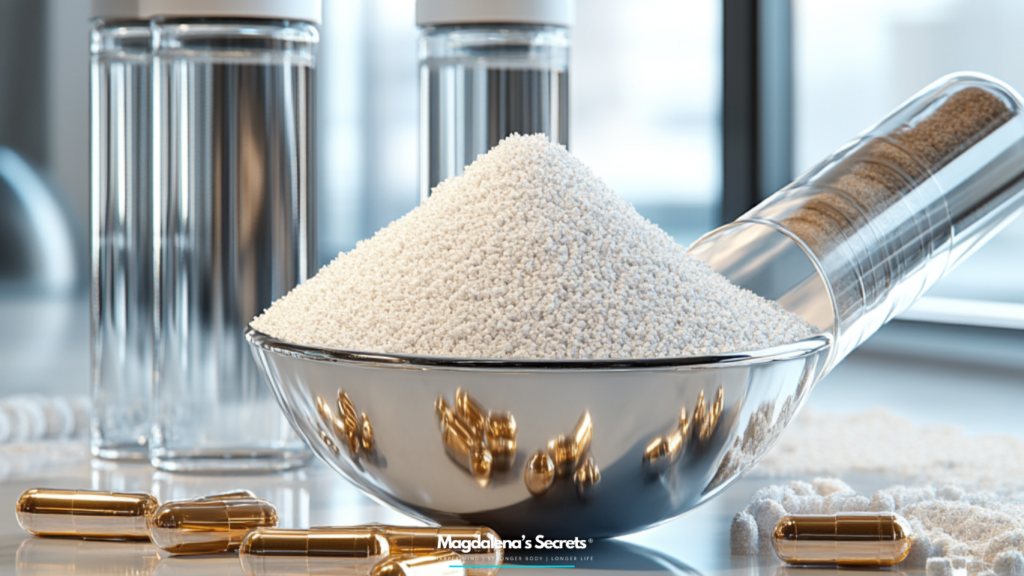If there’s one mineral that nearly everyone is deficient in — but desperately needs — it’s magnesium. Often called “the master mineral,” magnesium is responsible for over 800 enzymatic reactions in the body, influencing everything from hormone balance, sleep quality, stress resilience, to muscle and nerve function.
According to Dr. Barb Woegerer, magnesium is not just another supplement — it’s a foundational building block for optimal health, especially for women. In fact, she believes that if there were only one supplement she could recommend to the general population, it would be magnesium.
Why Is Magnesium So Important?
Magnesium is involved in nearly every cellular function in your body. Without enough of it, your systems — from cardiovascular to nervous — start to break down. Sadly, modern life depletes magnesium at a rapid pace.
Reasons why most people, especially women, are magnesium-deficient:
- Chronic stress, which burns through magnesium reserves
- Poor soil quality, reducing magnesium content in foods
- Processed food diets, lacking essential minerals
- Excess caffeine, sugar, and alcohol, which deplete magnesium
- Hormonal shifts, especially during menstruation, pregnancy, or menopause
When magnesium is low, women are more likely to experience:
- Anxiety and mood swings
- PMS and hormonal imbalances
- Muscle cramps and restless legs
- Sleep disturbances and fatigue
- Headaches and migraines
- Constipation and sluggish digestion
Dr. Woegerer emphasizes that magnesium isn’t optional — it’s essential, particularly for women juggling careers, children, hormone fluctuations, and high levels of stress.
Different Types of Magnesium and What They’re Good For
Not all magnesium supplements are created equal. In fact, the type of magnesium you take determines the benefit you’ll get. Dr. Barb Woegerer educates her patients on choosing the right form for their unique needs. Here’s a breakdown:
1. Magnesium Glycinate – The Calming Magnesium
Best for: Anxiety, sleep, PMS, mood swings
Magnesium glycinate is bound to glycine, a calming amino acid. It’s highly absorbable, gentle on the stomach, and ideal for those with stress, insomnia, and hormone-related mood issues.
2. Magnesium Citrate – The Digestion Supporter
Best for: Constipation and sluggish digestion
This form attracts water into the intestines, making it perfect for those who experience occasional constipation. Dr. Barb recommends it in low doses to avoid loose stools, and not long-term unless addressing digestive issues specifically.
3. Magnesium Threonate – The Brain Booster
Best for: Focus, memory, cognitive function
Magnesium threonate is unique because it crosses the blood-brain barrier and directly supports the central nervous system. It’s an excellent choice for people dealing with brain fog, cognitive decline, or high mental stress.
4. Magnesium Malate – The Energy Enhancer
Best for: Fatigue, fibromyalgia, and muscle pain
Magnesium malate plays a role in ATP (energy) production and can help reduce chronic fatigue and muscle tenderness. It’s often used by individuals with fibromyalgia or low daytime energy.
5. Magnesium Sulfate (Epsom Salts) – The Soothing Soak
Best for: Relaxation, detoxification, muscle soreness
Found in Epsom salt baths, magnesium sulfate is absorbed through the skin, making it a great option for post-workout recovery, relaxation, and stress relief.
6. Magnesium Oxide – The Budget Option (But Poor Absorption)
Best for: Occasional constipation or short-term use
Magnesium oxide has a very low absorption rate and is typically used for bowel relief rather than replenishing magnesium levels. Dr. Barb does not recommend this form for long-term supplementation.
How to Supplement
Most adults need between 300–500 mg of elemental magnesium per day — but if you’re under stress, pregnant, or very active, your needs could be even higher. Dr. Barb recommends starting slow, choosing the right form for your symptoms, and staying consistent.
Final Thoughts: Magnesium Is a Game-Changer
From balancing hormones, improving mood, easing PMS, supporting better sleep, to calming the nervous system, magnesium is the unsung hero of women’s health.
As Dr. Barb Woegerer says, “Magnesium is one of the most powerful, gentle, and supportive nutrients for women. Once you feel what it does for your body and mind, you’ll never go without it again.”
If you’re tired, stressed, or feel out of balance — it may not be more caffeine or medication that you need. It might just be more magnesium.




